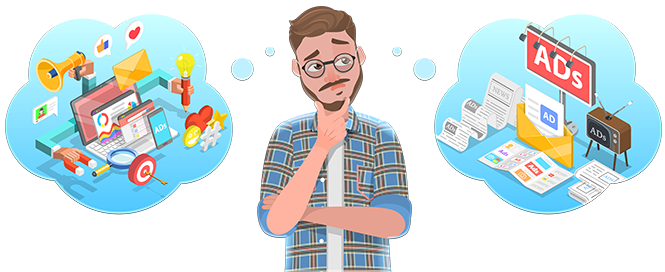In today’s fast-paced, technology-driven world, businesses must constantly evolve to remain competitive. One of the most significant transformations in recent years has been the shift from traditional marketing methods to digital marketing. But does digital marketing genuinely contribute to business growth?
At GEMDOS, we firmly believe it does. This blog will explore various digital marketing tools, highlight the differences between digital and traditional marketing, and demonstrate how digital marketing can drive business growth.
Digital Marketing - What is it?
In simple terms, digital marketing encompasses all marketing efforts that utilize the internet and digital technologies to attract and engage customers. From social media platforms and search engines to email campaigns and online advertising, digital marketing leverages the power of the internet to connect with potential customers in a more targeted, measurable, and cost-effective manner. This modern approach broadens your reach and allows for real-time interaction and engagement, making it an indispensable tool for businesses aiming to thrive in today’s digital age.

Digital Marketing Tools
What are they, and how they work in business marketing
In the digital age, a plethora of tools are available to help businesses reach their target audience more effectively. Each tool comes with its own set of benefits and strategies tailored to different aspects of marketing.
Here, we delve into some of the most prominent digital marketing tools and how they can be leveraged to elevate your business.
Keep in mind that this is only a brief overview of each of the tools. Since each business is different, each business will need to tailor these tools to match its audience. Creativity is needed to reach your audience with the tools provided.
1. **Social Media Marketing**
Social media platforms like Facebook, Instagram, Twitter, LinkedIn, and TikTok offer businesses unparalleled opportunities to engage directly with their audience. Through targeted ads, businesses can zero in on specific demographics, interests, and behaviors to maximize their reach. Organic posts allow companies to share content that resonates with their audience, fostering community and brand loyalty. Influencer partnerships can amplify your message, leveraging the trust and reach of influential personalities to build brand awareness, drive traffic, and boost sales.
Here are some great places to look at if you’re looking for Social Media Marketing:
Social Media Examiner– A leading source for social media marketing news and tips.
Hootsuite Blog– Offers valuable insights and strategies for social media marketing.
2. **Email Marketing**
Email marketing remains one of the most cost-effective and impactful digital marketing tools. Personalized and targeted email campaigns enable businesses to nurture leads, promote products, and retain customers by delivering relevant content directly to their inboxes. Automation tools can streamline this process, ensuring consistent and timely communication. By segmenting your email list, you can tailor your messages to different audience segments, increasing engagement and conversion rates.
Here are is a great place to look at if you’re looking to Email Marketing:
Mailchimp’s Email Marketing Guide- Comprehensive guide on email marketing strategies.
3. **Search Engine Optimization (SEO)**
SEO is the practice of optimizing your website and content to improve your rankings on search engine results pages (SERPs). Higher visibility on search engines like Google means more organic traffic to your website. SEO involves keyword research, on-page optimization, technical SEO, and acquiring high-quality backlinks. By enhancing your website’s relevance and authority, SEO drives traffic and establishes your brand as a credible source in your industry, potentially leading to increased sales and brand recognition.
Here are some great places to look at if you’re looking for SEO marketing:
Moz Beginner’s Guide to SEO- A foundational guide on SEO best practices.
Google Search Central- Official Google resources and documentation on SEO.
4. **Content Marketing**
Content marketing focuses on creating valuable, relevant, consistent content to attract and engage your target audience. This can take the form of blog posts, videos, infographics, eBooks, and more. High-quality content serves multiple purposes: it educates your audience, addresses their pain points, and provides solutions, thereby establishing your brand as an authority in your niche. Effective content marketing can drive traffic to your website, improve SEO, and ultimately convert visitors into customers.
Here are some great places to look at if you’re looking for Content Marketing:
Content Marketing Institute- A leading resource for content marketing strategies and tips.
Neil Patel’s Blog- Offers in-depth articles on content marketing and SEO.
5. **Pay-Per-Click (PPC) Advertising**
PPC advertising allows businesses to place ads on search engines and other platforms, paying only when a user clicks on the ad. This model ensures that your ad spend is directly tied to user engagement. PPC can be highly effective for quickly driving targeted traffic, as it allows for precise control over who sees your ads based on location, search queries, and user behavior. Platforms like Google Ads and Bing Ads provide robust analytics to measure the effectiveness of your campaigns, enabling continual optimization for better results.
Here are some great places to look at if you’re looking for PPC Marketing:
WordStream’s PPC University- Free resources and guides on PPC advertising.
Google Ads Help- Official Google Ads support and resources.
6. **Affiliate Marketing**
Affiliate marketing involves partnering with other businesses or individuals who promote your products or services in exchange for a commission on sales. This model can help you reach a broader audience without incurring significant upfront costs. Affiliates leverage their own networks and marketing channels to drive traffic and sales to your business. By providing affiliates with marketing materials and tracking tools, you can create a scalable and performance-based marketing strategy that benefits all parties involved.
Here are some great places to look at if you’re looking to Affiliate Marketing:
BigCommerce- A detailed guide that explains how eCommerce businesses can leverage affiliate marketing to drive sales and expand their reach.
Shopify– a detailed guide on starting and succeeding in affiliate marketing, with examples and tips for 2024.
7. **Influencer Marketing**
Influencer marketing leverages the reach and credibility of social media influencers to promote your products or services. By partnering with influencers whose audience aligns with your target market, you can tap into their established trust and rapport. Influencers can create authentic content that showcases your products in real-life scenarios, making it more relatable and appealing to their followers. This form of marketing can significantly boost brand awareness, drive traffic, and increase sales, especially among younger demographics who trust influencer recommendations.
Here are some great places to look at if you’re looking for Influencer Marketing:
Influencer Marketing Hub- Resources and guides on influencer marketing.
Sprout Social’s Guide to Influencer Marketing- Tips and strategies for effective influencer marketing.
8. **Online Public Relations (PR)**
Online PR involves managing your brand’s reputation through digital channels such as online news sites, blogs, and social media. Positive media coverage can enhance your brand’s image and credibility, while effective crisis management can mitigate negative publicity. Engaging with your audience through online PR efforts, such as responding to reviews and participating in industry discussions, further strengthens your brand’s reputation. By building relationships with journalists, bloggers, and influencers, you can secure valuable media placements that amplify your brand’s message.
Here is a great place to look at if you’re looking to PR Marketing:
PR News Online- A resource for public relations news and strategies.
Each of these digital marketing tools offers unique advantages and can be integrated into a comprehensive marketing strategy to drive business growth. By understanding and leveraging these tools appropriately, businesses can effectively navigate the digital landscape and achieve their marketing goals.
How Digital Marketing Helps Businesses Grow
Let’s go over a few ways in which digital marketing would help your business (or any business) grow. Understanding the high-level view of what makes digital marketing so great will help you construct your marketing plan or when working with a marketer.
1. **Targeted Advertising**
– Precision Targeting: Through tools like Google Ads and Facebook Ads, businesses can create highly specific audience segments based on demographics, location, interests, and online behaviors. This precision targeting ensures that the most relevant potential customers see marketing messages.
– Custom Audiences: Platforms like Facebook allow businesses to upload their customer lists to create “Custom Audiences,” making it easier to retarget existing customers or find similar audiences (lookalike audiences).

2. **Measurable Results**
– Analytics Tools: Tools like Google Analytics, SEMrush, and HubSpot provide detailed reports on various metrics such as website traffic, bounce rates, conversion rates, and customer behavior. This data helps businesses understand what is working and what needs improvement.
– KPIs and ROI: Digital marketing enables businesses to set and track Key Performance Indicators (KPIs) such as Cost-Per-Click (CPC), Customer Acquisition Cost (CAC), and Lifetime Value (LTV). This helps in measuring ROI more accurately.
3. **Cost-Effective**
– Budget Flexibility: Digital marketing campaigns can be started with minimal investment and scaled as needed. Pay-per-click (PPC) advertising allows businesses to set daily budgets and only pay when someone clicks on their ad.
– Affordable Tools: Email marketing platforms like Mailchimp and social media management tools like Hootsuite offer affordable plans for small businesses, making it easier for them to compete with larger enterprises.
4. **Increased Engagement**
– Interactive Content: Digital marketing offers various forms of engaging content, such as videos, quizzes, and polls. Interactive content can more effectively capture the audience’s attention and encourage sharing.
– Customer Interaction: Social media platforms allow businesses to engage with customers through comments, direct messages, and live chats, making building a community around the brand easier.
5. **Global Reach**
– 24/7 Availability: Unlike a physical store, a business’s online presence is always accessible. This allows customers from different time zones to interact with the brand at their convenience.
– Multilingual Content: Digital marketing tools make creating and distributing content in multiple languages easier, enhancing a business’s ability to reach a diverse audience.
Digital Marketing vs. Traditional Marketing
In most cases, BOTH digital marketing and traditional marketing are important in a business. But if you have to choose one at first, I would choose digital marketing, unless your business is in a smaller community in which the majority of your target market is above the age of 60.

1. **Interactivity**
– Engagement Opportunities: Digital marketing provides numerous opportunities for customer engagement through social media comments, blog posts, and interactive ads. This two-way communication builds stronger relationships and trust with the audience.
– User-Generated Content: Campaigns that encourage users to share their own content (photos, reviews, testimonials) create a sense of community and further promote the brand.
2. **Real-Time Feedback**
– Instant Adjustments: Businesses can quickly adjust their marketing strategies with real-time analytics. For example, an underperforming ad can be paused or modified immediately, unlike traditional marketing, where changes take longer to implement.
– A/B Testing: Digital marketing allows for A/B testing of different ad creatives, subject lines, and landing pages to identify what works best. This iterative process is much faster and more efficient than traditional methods.
3. **Personalization**
– Dynamic Content: Customer data can be used to create personalized emails and website experiences. For example, e-commerce websites can show product recommendations based on past purchases or browsing history.
– Behavioral Targeting: Advanced algorithms can analyze user behavior to deliver highly relevant ads, increasing the chances of conversion.
4. **Scalability**
– Adaptive Campaigns: Digital marketing campaigns can be easily scaled up or down based on performance and budget. This flexibility allows businesses to respond quickly to market changes and opportunities.
– Global Advertising: Platforms like Google and Facebook enable businesses to run international campaigns effortlessly, reaching millions of potential customers worldwide.
5. **Accessibility**
– Low Barriers to Entry: Digital marketing tools and platforms are designed to be user-friendly, making them accessible to even those with limited technical skills. Many platforms offer tutorials and customer support to help businesses get started.
– Equal Opportunity: Small businesses can compete with larger companies by leveraging digital marketing strategies effectively. With the right approach, even a small marketing budget can achieve significant results.
In conclusion, digital marketing is a powerful tool that can help businesses grow, increase sales, and stay competitive in today’s market. By leveraging the various digital marketing tools available, businesses can reach their target audience more effectively, measure their success, and adapt their strategies in real time. At GEMDOS, we believe in the power of digital marketing and are here to help you navigate this dynamic landscape.

